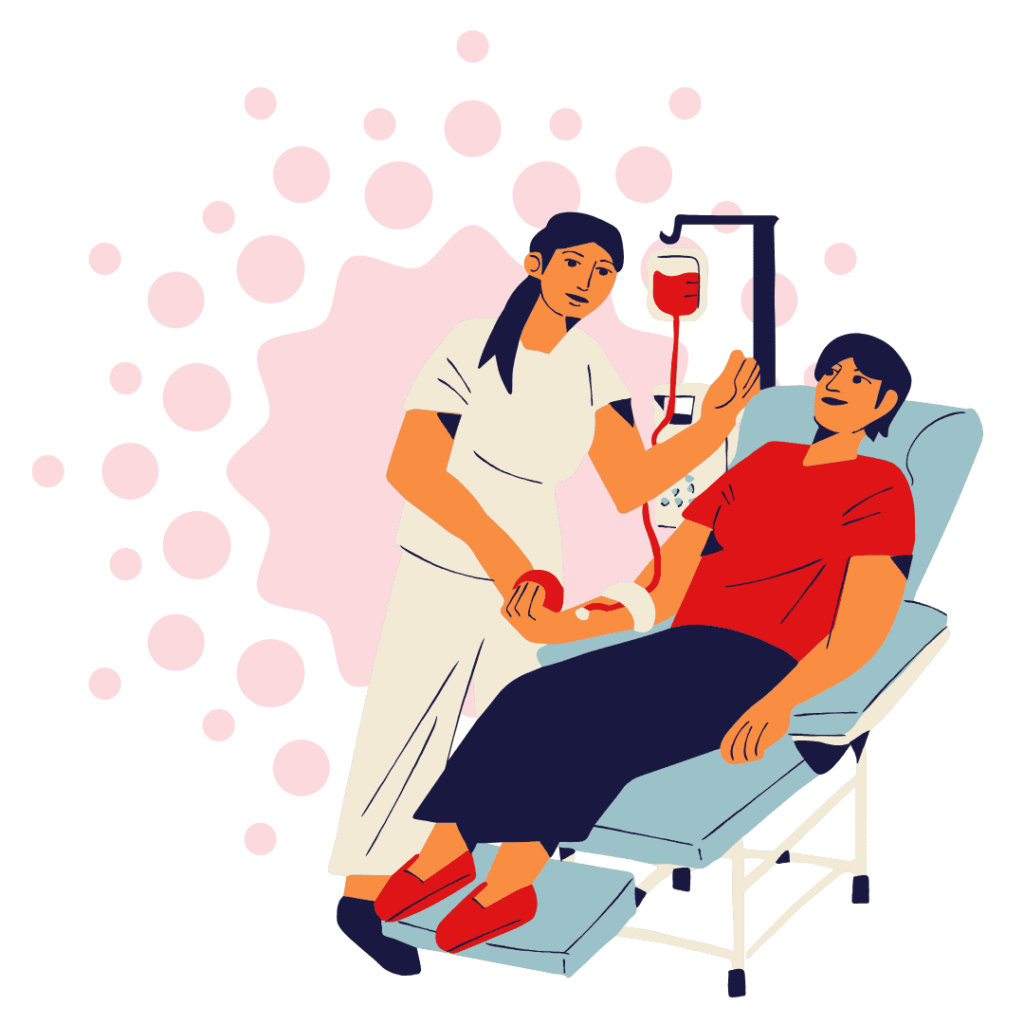Once a blood donor, always a lifesaver!
Your blood offers hope and a second chance. Donate today and make a life-changing difference.

Why Donate Blood?

1 Donation, 3 Lives Saved
One blood donation is split into red cells, plasma, and platelets, helping up to three people in need.

Change a Life Today
Every donation gives a second chance, helping others and strengthening the community.

Donate Blood, Boost Life
Regular blood donation improves heart health, reduces iron levels, and enhances well-being.

Quick, Safe, and Simple Process
Blood donation is fast, safe, and expertly handled—making a big impact with little effort.
How to Donate Blood?
1. Check Your Eligibility
Healthy individuals aged 18–65, weighing 45+ kg, can usually donate ! Some conditions and travel history may affect eligibility.
2. Register for Donation
Once eligible, register online via our website or at a donation center. Share basic details and schedule your appointment easily.
3. Visit a Donation Center or Blood Drive
On donation day, visit your donation center or mobile drive with a photo ID. Stay hydrated as a nurse checks your vitals.
4. Donation Process
Blood donation takes just 10-15 minutes. A professional safely collects a pint, potentially saving three lives. Enjoy refreshments afterward !
Are You Eligible to Donate Blood?
Stay safe, save lives! Check your eligibility before donating blood :
1. Age
Eligible donors are 18–65 years old. Those over 65 may donate based on health and a doctor’s advice.
2. Weight
You must weigh at least 45 kg. Eligibility may vary based on health conditions and medical guidelines.
3. Health Status
You must be in good health, free from fever, cold, or infection. Medications like certain antibiotics or blood thinners may affect eligibility.
4. Hemoglobin Levels
Donors must have adequate hemoglobin levels, tested on-site. Low levels may delay donation until restored.
5. Donation Frequency
You can donate whole blood every 56 days, platelets every 2 weeks, and plasma every 4 weeks. Follow the recommended wait times.
6. Travel History
Recent travel to certain regions may require a waiting period, especially for areas with diseases like malaria. Check the latest deferral list.
7. Recent Illness or Surgery
You must fully recover from surgeries, illnesses, or procedures. Certain conditions like hepatitis or HIV may require a waiting period.
8. Pregnancy
Pregnant women cannot donate. After childbirth or while breastfeeding, wait at least 6 months before donating.
9. Blood Pressure
Must be within a normal range. It will be checked on-site, and donors with high or low levels may be deferred.
10. Other Medical Conditions
Conditions like heart disease, epilepsy, HIV, or cancer may affect eligibility. Consult your doctor if you have a serious condition.
When You CanNot Donate Blood
Some conditions may temporarily or permanently prevent you from donating blood :
Temporary Deferral
- Recent Vaccination: e.g., yellow fever, malaria
- Pregnancy/Childbirth: Wait 6 months postpartum
- Illness/Infection: Flu, cold, etc.
- Recent Surgery: Major medical procedures
- Tattoo/Piercing: May require a waiting period
Permanent Deferral
- HIV / AIDS
- Hepatitis B or C
- Chronic Conditions: Active cancer, certain autoimmune diseases
- High-Risk Behaviors: e.g., intravenous drug use
Blood Donation Stories
Read about our inspiring Donor Stories
Where you can donate blood?
Looking to donate? Discover where you can give blood below!
Hospitals & Collection Centers
Donate blood at hospitals and certified collection centers, ensuring safe and professional care while making a life-saving impact.
Blood Donation Camps
Join mobile blood donation camps near you for a quick, convenient way to save lives in your community.

Ready to Save a Life?
Your blood has the power to save lives and give hope to those in need. Take the first step, donate today, and make a real difference!
Frequently Asked Questions
1. Who can donate blood?
Most healthy individuals aged 18-65, weighing at least 50 kg, can donate. Eligibility may vary based on health conditions and medical history.
2. How often can I donate blood?
Whole blood can be donated every 12 weeks (men) and 16 weeks (women). Platelet and plasma donations have different intervals.
3. Is blood donation safe?
Yes! The procedure is performed by professionals using sterile, single-use equipment.
4. How long does the donation process take?
The entire process takes about 30-45 minutes, while the actual blood collection lasts 8-10 minutes.
5. What should I do before donating?
Stay hydrated, eat an iron-rich meal, and avoid alcohol or strenuous exercise before donating.
6. Can I donate if I have a tattoo or piercing?
Yes, but only after 4-6 months, depending on local guidelines.
7. Does blood donation affect my health?
No, the body replenishes lost blood within a few days. Donating regularly can even have health benefits, such as improved heart health.
8. Who benefits from my donation?
Your blood can help accident victims, surgery patients, cancer patients, and those with blood disorders. One donation can save up to three lives!
